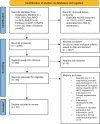Parents' experiences of psychotherapeutic support on the neonatal unit: A mixed methods systematic review to inform intervention development for a multicultural population
- PMID: 39467007
- PMCID: PMC12096267
- DOI: 10.1111/nicc.13194
Parents' experiences of psychotherapeutic support on the neonatal unit: A mixed methods systematic review to inform intervention development for a multicultural population
Abstract
Background: Parents of infants admitted to neonatal intensive care require support to minimize the impact on their mental health and to encourage engagement with their infants to support infant neurodevelopment. Many interventions aim to address this need, but there is a lack of research considering the accessibility of these for a multicultural population.
Aim: To systematically identify sources of psychotherapeutic support available for parents with infants admitted to neonatal care (NNU, neonatal intensive care unit [NICU] and special care units), assess their accessibility and acceptability and identify challenges and facilitators.
Study design: Six electronic databases with no restrictions on language or date were used to identify relevant studies following Preferred Items for Systematic Reviews and Meta-analysis (PRISMA) guidelines. Publications were included in the review if they reviewed parent experience of an intervention actively in place to support parent experience during the neonatal unit stay. Any studies where the intervention's primary aim was infant focused, such as developmental care, were excluded. All publications were quality-assessed using quality appraisal tools appropriate for their design type. Data were extracted line by line using Sekhon et al.'s theoretical acceptability framework and questionnaire.
Results: A total of 3309 studies were found, of which 36 studies met the inclusion criteria. Included studies were published worldwide between 2000 and 2023 and explored 15 different interventions. Challenges for parental engagement were due to preconceived ideas about intervention requirements and parents' ability to participate in them. Timely information and providers' experience in delivering the intervention were reported to support engagement and as being valuable for enhancing participant knowledge. The emotional content of interventions was found to be challenging by parents across most studies. This was prominent in interventions designed to be carried out in a group format and where keepsakes were created. However, the value of these interventions was in reducing parents' feelings of isolation through increased social support and providing a starting point for conversations with wider family and friends about the family's neonatal experience. Participant demographics were poorly reported, with only two studies taking into consideration the ethicality of the intervention.
Conclusion: Poor reporting of participant demographics, and a focus on mothers as participants, means findings are not transferrable to the wider population of parents in neonatal units. Future studies should consider how to ensure that research and interventions are accessible to multicultural populations to improve the understanding of the acceptability of interventions. Better knowledge of neonates and the NNU setting amongst intervention providers could increase the accessibility of psychotherapeutic support for parents. Training for providers on how to manage sensitive conversations may also be beneficial to support parents during interventions.
Relevance to clinical practice: The impact of neonatal admission on parental mental health is increasingly recognized and reported. Interventions have been developed to reduce the negative impact on the mental health of parents. There continue to be significant health inequalities as a result of many services not taking into account the acceptability and accessibility of interventions in this setting for their multicultural populations. This review highlights the need for better reporting of participant demographics in research and the inclusion of those seldom heard to ensure interventions are culturally, religiously and linguistically appropriate for multicultural populations.
Keywords: NICU; acceptability; multicultural; parents; psychotherapeutic intervention.
© 2024 The Author(s). Nursing in Critical Care published by John Wiley & Sons Ltd on behalf of British Association of Critical Care Nurses.
Figures
References
Publication types
MeSH terms
Grants and funding
LinkOut - more resources
Full Text Sources
Medical
Miscellaneous



